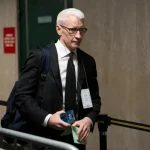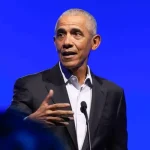
Let it not be said that Conclave, the new film about the selection of a new pope from director Edward Berger (All Quiet on the Western Front) and screenwriter Peter Straughan (Tinker Tailor Soldier Spy), is dishonest. I found it fascinating, unsentimental, and exceptionally keen in its understanding of human nature. Nevertheless, there is, at the picture’s heart, an ideological misjudgment that consigns its final moments to the realm of farce. The movie imagines that it has shaken the very foundation of the Catholic Church. In reality, its subversion is so modest that a single “Hail Mary” should cover it. Conclave’s poster declares that “what happens behind these walls will change everything.” The work of the movie is to reveal the emptiness of that promise.
The film stars Ralph Fiennes as Thomas Lawrence, dean of the College of Cardinals in present-day Vatican City. As the story begins, the old pope has died, leaving Lawrence to arrange the voting that will elect his successor. That process, undertaken in cloistered seclusion, provides not only the movie’s action but also its warily aggressive tone. If, as one character remarks, the closest corollary to a papal conclave is an American political convention, it is surely the smoke-filled room, with its backbiting and deal-making, that rings a bell.
The players in the film’s papal stakes, though finely sketched, are nonetheless contemporary religious “types.” Aldo Bellini (Stanley Tucci), an American progressive, is so worldly that he plainly despises Catholicism. Goffredo Tedesco (Sergio Castellitto), a conservative Italian, laments the 20th century’s reforms and would see the restoration of the Latin Mass. Were the college’s liberals united, Bellini might well prevail on the first ballot, so unpopular is Tedesco’s reactionary zeal. Yet other candidates must have their say as well — chief among them Joseph Tremblay (John Lithgow), a centrist Canadian schemer, and Joshua Adeyemi (Lucian Msamati), a winsome Nigerian with a secret.

Examined literally, Conclave is among the most Catholic movies ever made, a church procedural that takes as its daily bread the institution’s ancient and austere rituals. Looked at another way, it is as godless as reality TV. During each round of balloting, cardinals stride toward Michelangelo’s fresco of the Last Judgment, then swear before Christ that their vote is sincere. In between tallies, the men lunge at each other’s throats like jackals. Needless to say, this tension is darkly entertaining, like a fistfight at a funeral. “Let thy will be done, O Lord.” But also let me undermine, disqualify, or destroy my enemies.
Of course, none of this would work were the acting subpar. The opposite is the case here. Tucci, a reassuring screen presence for more than three decades, is casually excellent as the iconoclastic Bellini, wisely downplaying his character’s physicality in favor of meek conviction. Lithgow, currently superb in FX’s The Old Man, makes much of an underwritten role and should, as far as I’m concerned, be in every movie. Yet the glue binding the production is Fiennes, who strikes the perfect balance between ruthlessness and timidity and delivers the best performance of his late career. An interesting case study in movie stardom, Fiennes spent the ’90s anchoring such near-masterpieces as Quiz Show and The English Patient. Having since lost 20 years to Harry Potter, Lego movies, and James Bond, the 61-year-old may well be positioning himself for a Jonathan Pryce-style seventh-decade renaissance.
As for the film’s plotting, it is much what one would expect for the first nine-tenths of its run time. One cardinal accuses another of simony, the buying and selling of ecclesiastical office. A second produces evidence of an illegitimate child. Though the resulting turmoil precipitates fiery denunciations, broken clerical seals, and weeping nuns, Conclave never tips into melodrama. Instead, the movie simmers just below a boil, helped along by flawless pacing and a certain mischievousness of approach. If this is how princes of the church behave, perhaps the rest of us aren’t so bad after all.
Is Berger aiming knives at Rome? No more so than Doubt, the 2008 film by John Patrick Shanley based on his play of the same name. That picture, a meditation on spiritual decline, used the raw material of the church’s sex abuse scandal but had in mind a universally applicable moral: Those who chase monsters risk becoming them. Though Conclave’s setting is grander, the Sistine Chapel rather than a parish school in the Bronx, its preoccupations are similar. The difference is that while Doubt ends beautifully, opening for the viewer new avenues of insight and emotion, Conclave’s final moments are a disaster.
Given the priors of its likely audience, the film’s options were as follows. (Mild spoilers ahead.) Choice A: The reactionaries win, and white smoke rises to form a swastika. Choice B: The progressives are victorious, and violins swell. Choice C: A dark horse emerges, scrambling categories and sending the viewer careening. If the third of these possibilities is the smartest, it is also the trickiest to pull off. Whatever else it does, a surprise candidate’s ascension has to check thematic as well as narrative boxes. It has to mean something, not merely upend the audience’s storytelling expectations.
As it happens, what Conclave gives us is the wackiest and least effective conclusion of the cinematic year. Berger’s ending means nothing. Worse, it foolishly thinks otherwise. Attending the new pope is a revelation that really could throw the church into open schism. Yet, as the picture wraps up, it is clear that all parties involved will bury their knowledge. Never mind that the big shock is silly, sensationalistic, and riddled with logical errors. No one will ever know about it. For a twist that’s meant to “change everything,” this one falls startlingly short.
CLICK HERE TO READ MORE FROM THE WASHINGTON EXAMINER
Graham Hillard is editor at the James G. Martin Center for Academic Renewal and a Washington Examiner magazine contributing writer.





